Guinea fowl look similar to turkeys, but they are different. Hobby farmers may be interested in keeping them as small meat birds like they do with chickens. Their meat is gamey and tender.
Hens lay their eggs in the spring until around October. With proper conditions, hens can lay up to 100 eggs per year. In their prime, hens lay for 2 – 3 years.
Allowing them to free range at times during the day means they can manage insects, ticks, rats, mice, and other pests on your property as well.
Here I explain how to raise a guineafowl to maximize meat and eggs from this dual-purpose bird. It’s best to start with 2 – 6 in a small starter flock. They can be raised with chickens.
Guinea Fowl
When given the opportunity, guineas will mostly graze for their food. They’ll eat insects, vegetation, and more. Setting out a feeder with unmedicated poultry feed suitable for guineas is also important to be sure they are getting what they need.
Typically, their feed will have higher protein levels. Check with your veterinarian or ask at your local feed store. They may also suggest you supplement their diet with grit and oyster shell.
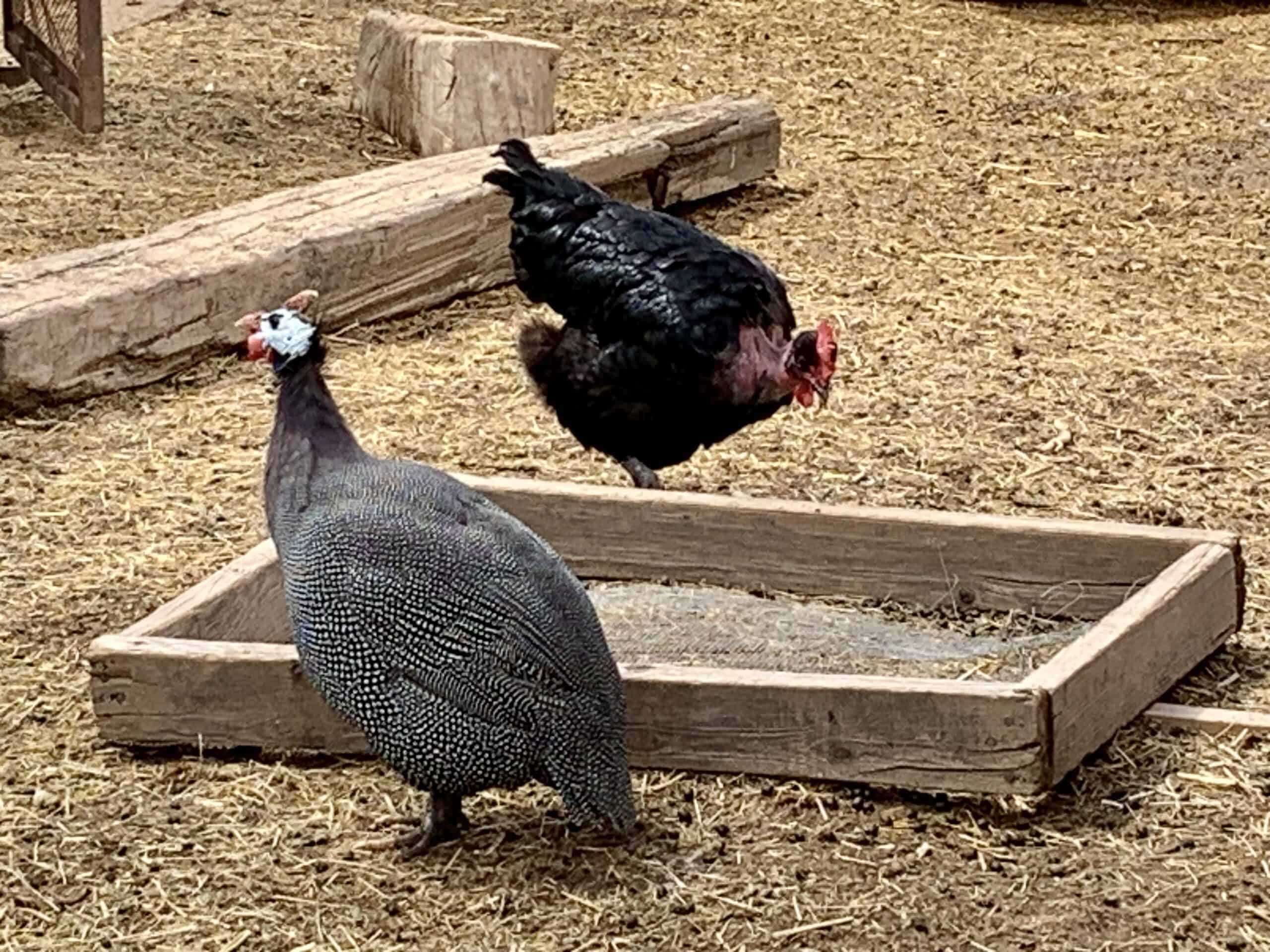
Guinea Fowl Characteristics
To understand guinea fowls better and for you to raise them well, here are some of their most notable characteristics:
They Don’t Know Boundaries
Have you ever noticed that chickens just seem to know that they’re not on their turf anymore? No one really knows why, but they do. Guineas aren’t like that. They will walk right onto the street and believe that they own it. Providing shelter and an enclosed run is important.
They are highly dominant, so they will run the coop and take over all the other birds on the property.
Eventually, the chickens you also have will need to adjust. Even the rooster will likely stay in a nesting box to try and get out of this bird’s way.
Guineas are Noisy
Did you ever hear someone be referred to as a Chatty Cathy? It means they talk all the time, and you will feel the same about guinea fowl, too.
- The hens tend to make noises that sound like the words “Come back.”
- Guinea roosters make “Chichi” sounds.
In a sense, this one of the easiest ways to tell the different sexes apart.
Please be aware that guineas not only talk all the time, but they do so very loudly. They are noisy. If you prefer a quieter backyard or think the neighbors will complain, then guineas might not be right for your homestead.
Guinea Fowls are Protective
One of the best advantages of owning a guinea fowl is that they are protectors. They will watch over the homestead. Even if you don’t have a lot of predators, you never know when one might crop up.
Since the guinea fowl is alert and somewhat dominant, it will protect your other animals.
“Do guineafowl keep snakes away?” Yes!
There is much evidence pointing to the fact that guinea fowl will deter, surround, harass, or even kill smaller snakes if they are on the property. However, guineafowls aren’t likely to eat them. At the very least, they will let you know a snake is nearby.
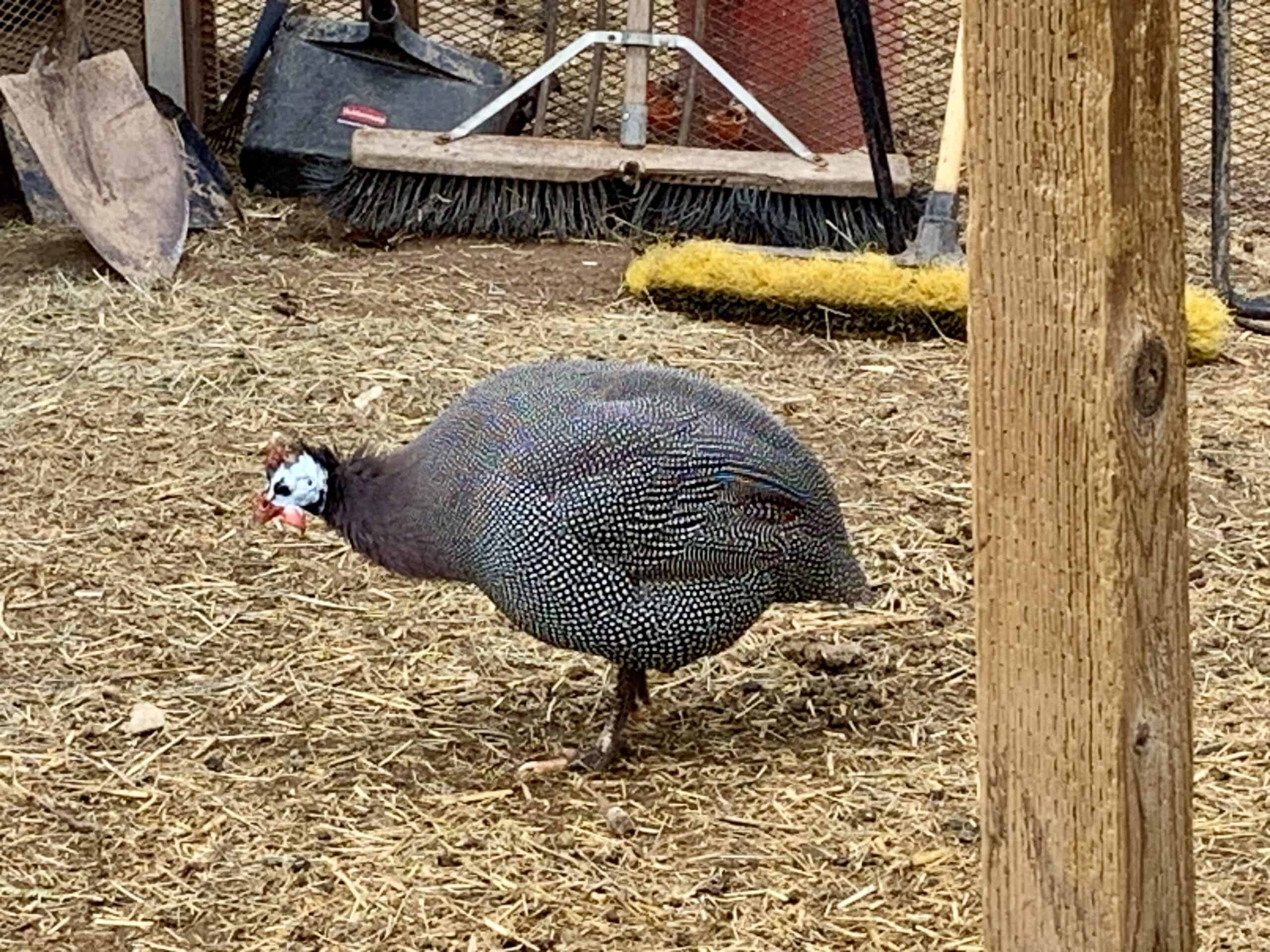
Guinea Fowl Help with Insects
Do you have a pest problem? Many homeowners do, especially if they have a garden. June bugs, ticks, and even mosquitoes are no match for guineas, though.
Yes, you need to learn how to raise guinea fowl correctly, and once you do, let them graze. Guineafowl will help manage insects.
Require Training
Guineafowls are not domesticated; they don’t need a coop and can even roost in trees. However, you’re going to want a coop so that they come home at night and roost.
Keets
With guinea fowl breeding in mind, you usually need to start with keets, so you need to raise them just like a duckling or baby chick. They need a starter feed and a brooder box. During those first few weeks, you also have to keep them warm and protected from the rain and wind.
Once they are ready to go free-range, you have to be careful. It’s easy to think you can let them all go at the same time, but this is a big no-no. Generally, these birds like to travel in groups.
When they’re all out, they might think that your property is their home, so they’ll just roam around everywhere. That is unless you give them proper training.
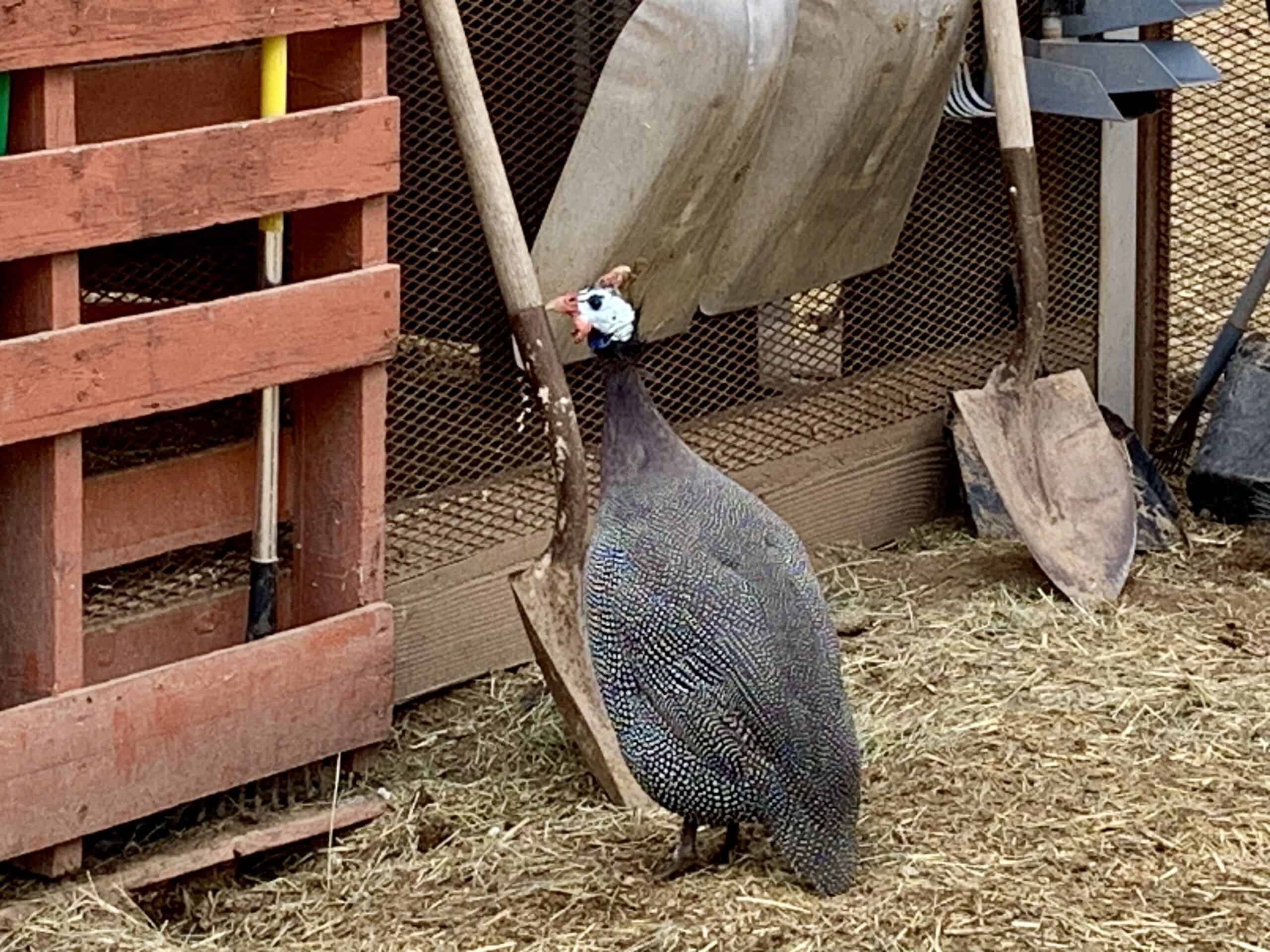
Mature Guineas
With all that in mind, you don’t really have to start with babies and can raise them from adulthood. The same rules apply, though; it’s ideal to coop them on your property for about six weeks, plus you need to release one guinea a day or every other day.
They will not leave one another, so they will come back home for roosting. Once all the guineas are released, they will know what part of your property is their home.
This is the way to do it regardless of whether you have babies or adults.
Plus, if you keep the roost full of water and food, they will want to come home each day instead of roosting in trees.
They Make Poor Moms
Remember that guinea fowls are flighty and fast-paced birds; they like to be on the move as often as possible. They also lay eggs seasonally, and they can hatch a full clutch in about 26 or 28.
They aren’t like chickens, though, which prefer nesting boxes; instead, guineas like to make nests on the ground or many times, they go off to the woods to build their nests.
What you need to do is move the eggs back to the coop if you can find them. Otherwise, you will have keets all over the place.
Guineas are excellent setters, but the issue is that when the eggs finally hatch, the moms are out running off again.
They do take their babies with them, but they go through wet areas without fear. That can cause the babies to get too cold and die.
As such, if you want to raise baby guineas and consider guinea fowl breeding, you’ve got two options.
You can choose to put the eggs under a hen, as she will raise them as her babies and take good care of them.
Otherwise, you can incubate the guinea eggs and raise them the same as if you bought day-old keets. Leaving it up to the guinea hen means that the chicks aren’t as likely to survive.
Guinea Fowl Can Fly

Chickens can’t fly, though they can hop higher with their wings.Remember that guineas aren’t like chickens at all.
Guineas can fly, meaning take flight.
They will fly to the top of the house, sit on fencing posts, and maybe just fly right over the fence itself.
Most people don’t realize that guinea fowl can fly; in fact, you may only notice they are gone when they walk back from wherever they flew to.
They can’t fly long distances, but it’s an amazing sight to see them soar over the house.
Just be prepared for this eventuality.
They’re Great Gardeners
We already discussed that guineas like to eat bugs and protect things. They are sure to save the garden once or twice a season.
Your chickens and ducks can also do so, but one thing to keep in mind is that they can destroy plants on accident.
Chickens eat bugs, but they can eat the plants or scratch the ground around the plants.
Ducks also prefer to eat bugs, but they have very large feet, so you have to wait until the plants are large enough.
Otherwise, ducks can squash them while eating the bugs from them.
Guineas don’t do any of those things or eat the plants.
They are more delicate with the plants, do not scratch at the ground, and eat the bugs.
Guineas are Fast
If your guinea gets out and you want to catch it, your best bet is to know where it is going and get there first.
Guineafowls are excessively fast, and you probably won’t be able to catch them unless it’s nighttime and cooped up.
Even then, there’s only one shot, and if you don’t succeed, that’s it for the night.
To catch your guinea, you need to grab it by the wings or use a net so that you don’t hurt them.
Please note that guineas have brittle legs, so if you grab them there, they are likely to try to get away and break their leg in the process.
A net is the best and most humane option.
Regardless of the method you pick, be prepared to laugh at yourself because it can get quite hilarious.
They Entertain
Chickens are hilarious to watch, as are goats and ducks, but you may not know that guineas are also quite hilarious to watch.
They will shuffle around the property looking for bugs, and this is very adorable.
If you’re lucky, you can watch them outsmart cats and run them off, which is quite funny, too.
You may as well enjoy them, as they are free entertainment.
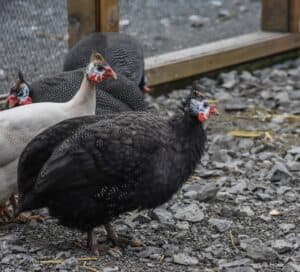
They’re Low Maintenance
Guineas can forage for their own food and don’t require a coop, plus you don’t have to make or provide nesting boxes.
Of course, we did mention earlier that a coop is ideal for roosting needs.
Still, guinea fowls are quite low maintenance because you don’t have a large home to maintain or boxes to clean.
They’re happy enough just flying around, eating garden bugs, and scaring off predators.
You’re going to feel complete with these birds on your homestead, but, of course, they do have pros and cons attached to them. Nonetheless, they are amazing birds.
Use as a Food Source
Is a guinea fowl good to eat? Though most people choose chicken for eggs and meat, you can eat any poultry and its eggs, including guineas.
Meat Quality
Guinea meat does taste different than chicken because they’re wild birds and have been somewhat domesticated.
As game birds, their meat can be quite gamey and may taste similar to pheasants and others.
Guinea fowl meat is also leaner and has about half the fat content of chicken.
Therefore, you’ve got a meat-to-bone ratio of about 50-50.
Generally, it is best to eat guinea meat when the fowl are younger or up to 11 weeks old; this way, the meat is more tender.
The meat tends to get tough as the guinea fowl grow.
Also, the female may have tender meat while the males usually have tough, gamey meat.
How to Cook Guinea Meat
Since guinea meat is leaner than chicken, you need to cook the dark meat carefully for it not to be stringy or dry.
The best methods for cooking include slow-roasting with a lot of extra fat or using an instant pot.
The meat needs moist conditions in which to cook so that they taste better.
You’re probably going to want to cook the meat until it reaches a temperature of 158 degrees Fahrenheit.
This temperature is different from other poultry, which you need to cook up to 165 degrees Fahrenheit.
Guineafowl Eggs
Those who can’t stand game-bird meat can still consume guinea eggs.
Keep in mind that guineafowl don’t lay eggs as often or as many as a chicken, but you can eat and use them similarly to traditional chicken eggs.
The eggs are smaller than chicken eggs, so about two guinea eggs will be equal to a conventional chicken egg. They are quite tasty and very rich and creamy.
These eggs also tend to be light brown and have tiny speckles all over them, plus the shells are quite hard. Thus, you have to whack them hard against the bowl to crack them.
There is also a different white-to-yolk ratio than with chicken eggs since they have a little more yolk than egg white.
Guineafowl
As you can see, guinea fowls are amazing birds and can provide a reliable food source for you and your family. They are independent and like to fly, but there are tricks you can use to keep them home at night.
They’re low maintenance, which means you don’t need to make a large coop or nesting boxes.
Additionally, you can watch them and be entertained for hours. If that weren’t enough, they keep away pests and predators, such as snakes and mice.
Also, they are an excellent meat source and a decent egg source.
Which Duck Breed Is Best for Egg Production, Meat or Pet?
As long as you know how to handle them, guineafowls are easy to raise. If you are looking for other poultry to raise, consider:

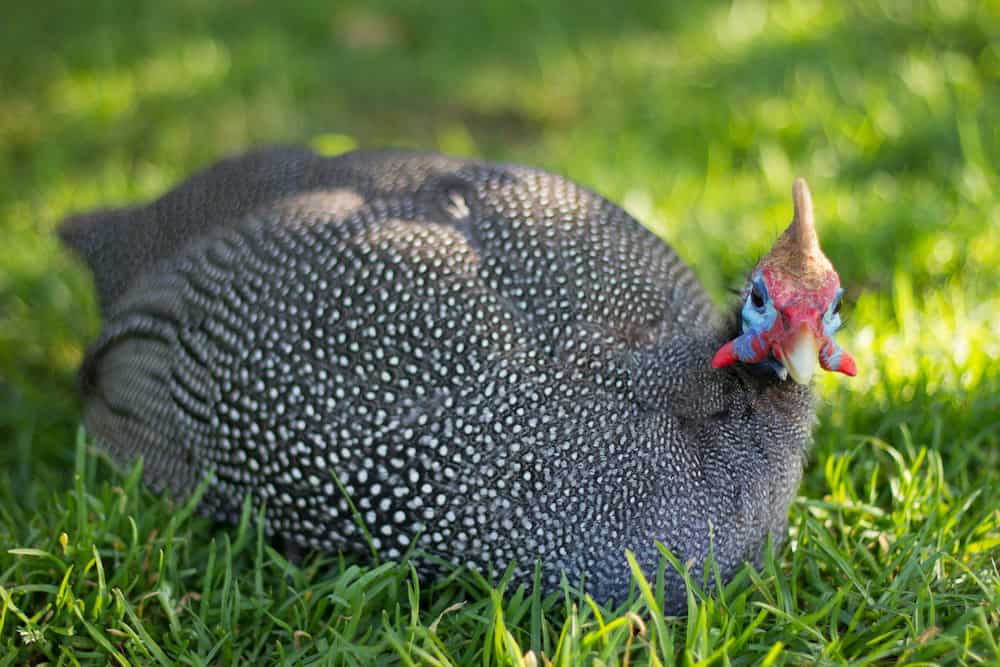
Nice article. Enlightening